Clinical Psychologist Roni Beth Tower on a Miracle at Midlife in Paris
- SUBSCRIBE
- ALREADY SUBSCRIBED?
BECOME A BONJOUR PARIS MEMBER
Gain full access to our collection of over 5,000 articles and bring the City of Light into your life. Just 60 USD per year.
Find out why you should become a member here.
Sign in
Fill in your credentials below.
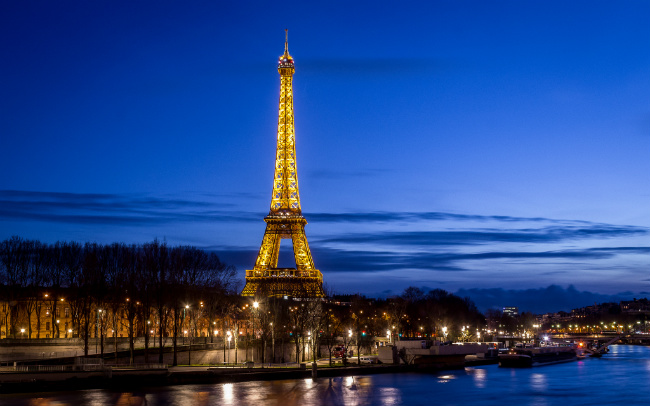
Eiffel Tower by Gadjo_Niglo/ Flickr
Roni Beth Tower grew up in Akron, Ohio, majored in religion at Barnard College, earned her doctoral degree in clinical psychology from Yale University, and did postdoctoral work in epidemiology and public health at Yale Medical School. She is the author of “Miracle at Midlife: A Transatlantic Romance,” which tells the unlikely (but true) story of how she, a fifty-something clinical psychologist living in Westport, Connecticut, met her husband David– who was, at the time, an international lawyer living in Paris on a converted barge in the Seine– and how they fell in love, and conducted a passionate, whirlwind, life-changing romance. She and David now live in Tarrytown, New York, and return to Paris as often as they can. [Read Roni Beth Tower on 1960s Paris here.]
Janet Hulstrand: Early on in “Miracle at Midlife” you describe Paris as being for your husband, David, “a city that encouraged him to become the person he liked being.” And you say that, for yourself, Paris “inevitably grounded me, opening my emotions in response to her beauty, her balance, her legacy of being loved.” Can you say a bit more about this? What is that special something about Paris? What is that power it holds for so many people?
Roni Beth: Paris has affected David and me in profound but somewhat different ways. For David, Paris offered attitudes that liberated him from constraints he felt in the United States, and a pace that suited his temperament. In contrast to the East Coast pursuit of maximum efficiency, the French value human relationships in daily life. David found support for his needs that went beyond earning money or flattering his ego by doing work that was deemed “important.” French laws mandate universal healthcare, state-supported education from day care through university, time off for family demands, support for older adults. These are formal manifestations of the importance to the French of human welfare, and of preserving time for le plaisir. In France, people and their needs warrant attention and resources. At the micro-level, the essential “Bonjour, Madame” or “Bonjour, Monsieur” reflects the underlying respect people give to and expect from each other.
In Paris, David could walk more slowly. He could enjoy the experience of both the exercise and the feast for the eyes that paraded in front of him. His clients understood that he was entitled to claim time for his personal life, to enjoy, to recalibrate. New York expectations that he would work and be available 24/7 disappeared. The French explicitly honor restoration: it is the root of the word “restaurant.” They take time off for real meals, to faire le pont (maximize benefits by taking a longer break whenever a holiday falls near a weekend), and to schedule periodic vacations both in schools and at work.

“Miracle at Midlife: A Transatlantic Romance” by Roni Beth Tower
My initial attachment to Paris springs from the qualities I refer to in my book. The beauty of the city nourishes my soul every day that I am there. The natural light, regardless of time of day or season, intrigues and mystifies me. The curves of the Seine force constant shifts in perspective. These natural phenomena are complemented by the human-made beauty of the buildings, the gardens, the parks, the artificial lighting and the people. There is a micro level here, too. Everywhere you look, people seek to infuse beauty into their city. Last winter we discovered hand-knit unique “hats” perched atop posts (poteaux) along the sidewalk on Avenue Rapp; huge murals decorating sides of government housing in the 13ème; smaller surprise paintings of charming street art in the 3ème. Not only does the Orchestre National de France fill its new auditorium at Maison de la Radio with renditions of Debussy and Dvořák, but small groups of musicians pop up in support of charities, playing on street corners like Place d’Italie, or even drumming to support marathon runners and entertain those who cheer them on. Attention to detail, to creating pleasure for the senses, to maintaining what already exists – from a lamppost to a patisserie display – reflects an understanding that creation and beauty feed the spirit.
Another thing that enchants me about Paris is time perspective. The culture and the people embrace heritage, age, wisdom. Buildings are more likely to be renovated internally, their exteriors left intact, than destroyed. Catherine Deneuve and Emmanuelle Riva, among others, continued to star in films in their seventies, Riva until her death this year at 90. The noble roots and history of the city (and country) are visible in respect for agriculture, creativity, tradition. At the same time, impermanence is acknowledged. Every time I walk along the Seine or watch a sunset I am reminded of this truth. The French embrace the necessity of letting go, innovating, meeting needs that have evolved. A train station was repurposed into the magnificent Musée d’Orsay. The Centre Pompidou, the Bibiliothèque Nationale de France, la Villette and so many more places were deliberately created to be nourishing gathering spaces for the people.
Finally, for me, along with those curves of the Seine and the ever-changing role of perspective, the uniqueness of Paris lies in the language. Spoken French, filled with melody, grace and harmony, has a softness that mirrors the curves of the river, the old cobblestone roads, much of the architecture, creating music that resonates somewhere deep within me. And, of course, there is le plaisir – the pleasure of eating, of drinking, of reading, of loving…

Roni Beth Tower
Janet: You talk quite a bit about the importance of “plaisir” in French life and culture. What do you think is the main beneficial effect of a culture that places so much emphasis on pleasure? And are there any drawbacks?
Roni Beth: Our brains come with reward centers and pathways that encourage us to embrace pleasure. If we listen, our desires can tell us when we need to eat, sleep, move, relate to other people, express our inner feelings, stretch. They announce when we need to take in and when we need to give back to the world, to be and to do, to consume and to produce. But the solutions to our needs vary with the culture in which we live, and so too can our perceptions of when we are in balance.
The appreciation of pleasure seems essential to French culture. Le plaisir from a perfume, a digestif, a fabric, a shop window, an illumination, a new book or performance or gathering or discussion. Through support for le plaisir, the culture urges people to make time and space for pleasures for body, mind and soul.
The Eastern corridor of the United States, where I have (mostly) lived since 1962, values efficiency and effectiveness. “Success” is a primary value, and it is usually measured numerically. Steps climbed take precedence over experiences encountered along the way. Even time spent in a headstand or number of yoga poses mastered can take priority over the pleasure of stretching one’s body in a context of joy and discovery. America’s Puritanical roots have left us with a split between body and mind/soul that is often equated with bad/good. Physical needs – for food, sleep, movement, touch – and the natural pleasures that can push us to them – taste, rest, activity, companionship, smell and sound – are exploited by advertisers everywhere, but are destined to have a different impact depending on the state of deprivation and legitimacy of our needs.
When I met David, I knew how to work and how to relate to others, but I wasn’t taking very good care of my body, my need to play, and to be cared for. Because he and Paris brought me so much plaisir, I was able to pay attention, adjust my choices, and thrive. I think that was what I meant when I confessed to a friend “I like myself better in France.” Becoming more comfortable with what brought me pleasure helped me find my own internal compass, and be less at the mercy of all those external cultural messages telling me what I “should” do or want or be. It brought me la liberté. I think the main benefit of paying attention to and respecting plaisir is that needs become legitimate.
The main drawback to a culture so filled with plaisir is a risk of going overboard and losing our internal compass. When that happens, we become susceptible to using addiction as a distraction from our unmet needs on the one hand, and to seduction (from people, posters, social praises) on the other. Le plaisir needs to be modulated by discernment and discretion. Luckily, independence of spirit and discernment are additional strong points of French culture.
Janet: I enjoyed reading “Miracle at Midlife,” but I must confess I’m really interested to know what happened after the end of the book…that is, when you decided to take the big leap of faith and move to Paris to be with David. Were you able to work in France? Was it easy or hard getting a work visa? What was the hardest thing, generally speaking, about the transition to life in France for you? Did you and David eventually decide to marry? Also, when and why did you and David decide to leave Paris and return to the States?
Roni Beth: When I arrived in Paris, I came with three lingering professional responsibilities – revisions of a scientific paper on marital styles and longevity in older married couples; a contract with a literary agent in New York, who expected me to write popular nonfiction; and volunteer commitments to Yale. After the first six months, during which we were also dealing with major property issues on both sides of the Atlantic, I settled in to attend to those responsibilities and to adapt to living in France. That October, the American Church in Paris held its annual series of orientation sessions for English-speaking expats, “Bloom Where You’re Planted.” I soaked it up like my skin was absorbing moisturizer in response to the level of calcaire in our water! After the program ended, I decided to get a French drivers license. The next task was improving my language skills, so I enrolled in an immersion program at the Institut Catholique. I reasoned that only after I felt more fluent could I identify the best ways to work while living in France. Research? Teaching? Consulting to expats? Something entirely different?
I loved living in Paris. I loved living with David. The hardest part was living six time zones and so many miles away from others I also loved. This was 1998; email had become an option, but phone calls remained expensive and Skype was still conceptual, at least to me. Luckily, because Paris brings her visitors so much plaisir, my kids and several friends were happy to visit.
David and I were married in June of 2000 in the United States, when our four grown children, one son-in-law, one daughter-in-law, one fiancé, and two grandchildren could all share the moment with us.
Janet: One often hears that it is hard to make friends with the French, especially with Parisians. Is this something you managed to do, either through David or on your own? If so, how did that happen? And what advice would you have for expatriate Americans living in Paris, about how to make French friends?
Roni Beth: I was lucky. Because David’s language was perfect, his understanding of French sensibilities deep, and his 25 years of living in Paris had been filled with cultural awareness, he was more French than American at that point, and was embraced by friends and colleagues wherever he went. David will say they welcomed me avec plaisir. I often needed to ask him about a faux-ami or phrase that I sensed I had misunderstood, but I kept working at it. I made two expat friends, a Canadian and an Australian, through the American Church, and an American friend at the Fehrenbach Driving School. My dearest friends were a woman whose husband staffed the emergency room at the American Hospital – I met her after a plateau de fruits de mer landed me in her husband’s care – and a French woman who became my landlady. Between her improving English and my “plus lentement, s’il te plait,” we managed to understand each other, and our respective lives, with increasing intimacy. Bonds with both women were based on sharing a wonderful time whenever we were together. My French friend may have trusted my ethical code as a psychologist; she knew I would be discreet. Over the years I have made more French friends. I think the key has been that I am an introvert – quiet, more interested in listening than talking, yet curious and enthusiastic about the culture and the people who live it. And I do not try to deny our differences or judge them. Also, David and I have stayed connected with some truly wonderful people and their expanding families. Now their grandchildren have stayed with us, or celebrated holidays in our home, when doing internships in New York.
Janet: How often do you get back to France now? What do you miss most about it when you’re in the U.S., and what did you miss most about the U.S. when you were in France?
Roni Beth: In 2008, close friends bought a pied-a-terre that we can rent when they are at home in the U.S. I had retired in 2006 and the combination allowed more frequent visits – two to four a year – but our trips remained short because our dog was aging and we did not want to leave him for long periods. He died at 17½ years old in 2012. Since then, we go to France two to four times a year, and now we spend at least two months in Paris every year. Because I believed our grandchildren could never fully appreciate or understand David unless they grasped who and how he was in France, we have brought five of the six grandchildren with us for a one-week visit, each on a separate trip, during the year around their twelfth birthday. The youngest will come with us next April.
What do I miss most about France when I am in Tarrytown? The music of the language. The energy. The pace. The walking. The people. The eye candy. The fresh fruits and vegetables and the cheeses. What do I miss most about the U.S. when I am in France? Our children and grandchildren. I do not miss “efficiency” – driving a car, eating a meal in one-third the amount of time, not taking time to chat with people I encounter in daily life.
Janet: What do you think are the fundamental differences between life in the U.S. and life in France, the things that actually influence the way life is lived on a daily basis?
Roni Beth: Priorities. Expectations. Connection. Integration. And, of course, commitments to beauty, civility, and le plaisir.
Janet: What are you working on now? Is there a sequel to “Miracle at Midlife” in the works?
Roni Beth: The sequel is “in the drawer.” The essays that I wrote while living in Paris are waiting to be assembled into a memoir that tells the story of the next chapter in our life. A unifying theme of Miracle was discovering, developing, sustaining a midlife love relationship between a man and a woman. Book Two will probably be about appreciating a love of place, the meaning of home, and the role of context in one’s life. I’m also due to update “Paris From a Personal Perspective,” my 188-page manuscript of information and ideas that might be useful to those who visit Paris, whether for the first time or the fiftieth, and with or without kids. I have also enjoyed writing “Life, Refracted” for PsychologyToday.com. The series “52 Ways to Show I Love You” will be complete in January, but I know other aspects of living and loving will nudge me to write about them.
I have enjoyed talking with people in groups. After a career spent mostly talking one-on-one – with students, clients, patients, friends – now, as a writer, I can reach people I do not know. Hearing and responding to their stories has been a huge gift, an opportunity to use what I’ve learned and to remain open, to continue to discover. I look forward to leading workshops on loving and being loved, which are in the works. And on a weekend afternoon in February, I will be discussing themes from my book at The American Library in Paris. The time and date are yet to be determined, but I invite any and all to join me there!
Order Roni Beth Tower’s book on Amazon here:
Lead photo credit : Eiffel Tower by Gadjo_Niglo/ Flickr
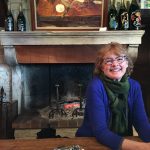
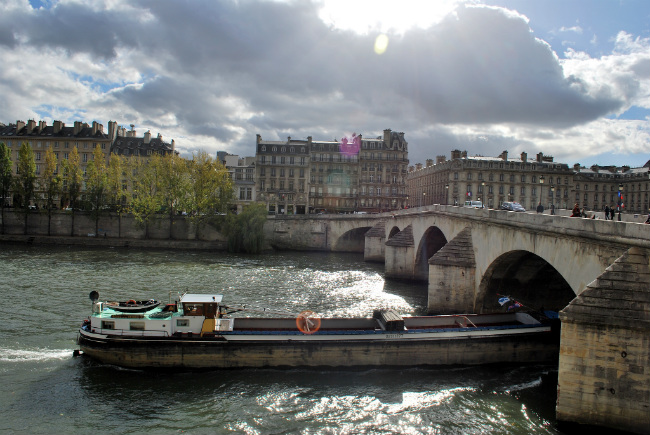
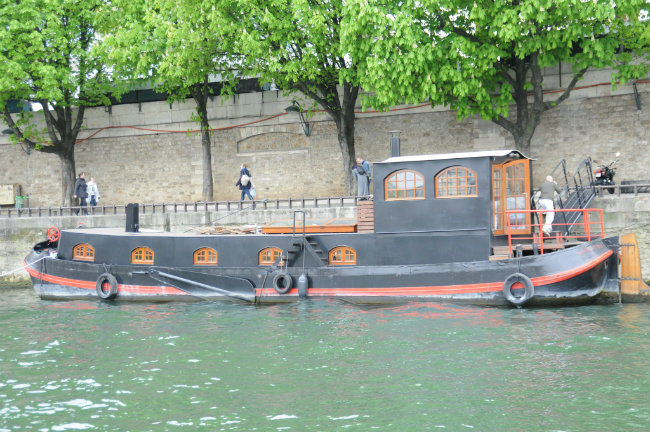

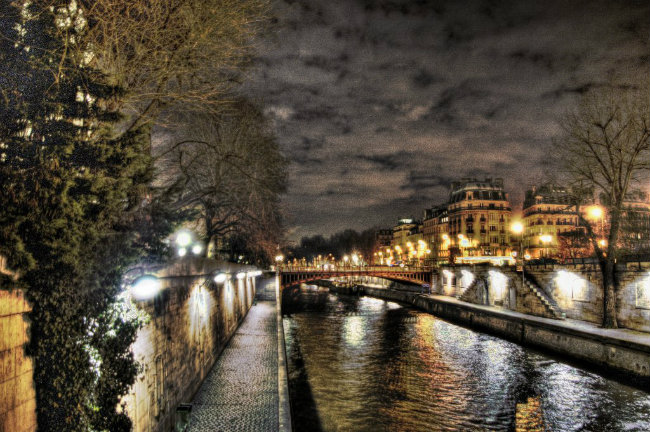
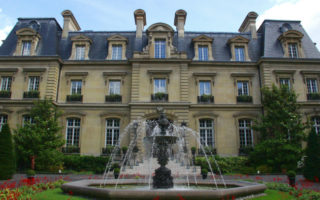
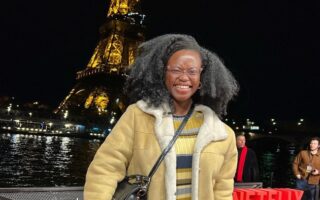
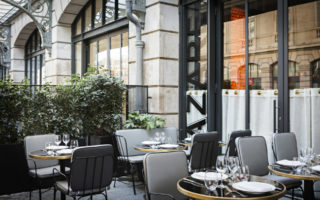
REPLY
REPLY
REPLY
REPLY
REPLY
REPLY